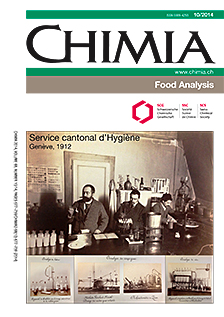Unexpected Occurrence of Caffeine in Sleep-Inducing Herbal Teas
DOI:
https://doi.org/10.2533/chimia.2014.705Keywords:
Caffeine, Herbal tea, Linden, Tilia spp, Uplc-ms/msAbstract
Caffeine acts as a weak psychostimulant and is known to cause trouble with sleeping. Therefore, the presence of caffeine in sleep-aid herbal teas was somewhat surprising, and confirmatory investigations were conducted to exclude any possible misidentification. The botanicals of the sedative mixtures were analysed individually by ultra performance liquid chromatography (UPLC) coupled with a time-of-flight high-resolution mass spectrometer (TOF-HRMS), and caffeine was detected in linden (Tilia spp.) extracts. The presence of caffeine was unambiguously confirmed by means of its characteristic mass spectrum acquired during direct analyses of powdered linden by thermal desorption coupled to a GC×GC-TOF-MS. Caffeine content was determined in 11 linden-based samples, with a validated UPLC-MS/MS method using two mass transitions. Concentrations were between traces and 110 mg kg–1 in the herbal material while those in the corresponding prepared sleep-inducing hot beverages ranged from traces to 226 ?g per cup.Downloads
Published
2014-10-29
Issue
Section
Scientific Articles
License
Copyright (c) 2014 Swiss Chemical Society

This work is licensed under a Creative Commons Attribution-NonCommercial 4.0 International License.
How to Cite
[1]
C. Mathona, P. Edder, P. Christen, S. Bieri, Chimia 2014, 68, 705, DOI: 10.2533/chimia.2014.705.







